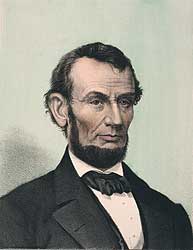| Pratt Street Riot | Baltimore Bastille | Habeas Corpus | Coast Guard | Garrison Flag | Timeline | All Photos |
"All the Laws but One:" A Writ of Habeas Corpus
Fort McHenry, May 1861

|
| Abraham Lincoln. |
The war began in 1861, and until Congress could convene in July the President was forced to make decisions without the advice and consent of Congress. One of these was deciding on measures to take to insure Maryland did not secede and join the Confederacy.
Maryland was rife with secessionists. Many prominent citizens in the state openly voiced their hatred for Lincoln and the U.S. Army. Many supporters rallied to their call of "Secession" in Baltimore. Obviously, Lincoln was desperate to keep Maryland in the Union for it was through Baltimore that vital rail and telegraph lines passed from the west and north before proceeding to Washington. So determined was the President to preserve the north's tenuous hold on Maryland, that he sanctioned extreme measures against the state's secessionists.
A Writ of Habeas Corpus
On April 27th Lincoln startled the country by suspending the Constitutional privilege of the Writ of Habeas Corpus along the military lines from Washington to Philadelphia. Habeas Corpus is the personal right that goes back to English common law, predating our own Constitution. In short, the Writ says that a person being arrested must be charged with a specific crime or he/she must be released. It is a safeguard against unlawful seizures and violation of due process. By suspending the Writ, Lincoln gave de facto powers to the U.S. Army to arrest, and hold indefinitely, anyone it pleased. Lincoln's aim was to silence any opposition that might catapult Maryland into secession and to preserve national safety.
John Merryman
On May 25, 1861, U.S. Soldiers arrested John Merryman at his home "Hayfields" in Cockeysville, Maryland. He was a lieutenant in the Maryland State Militia who had (under orders from the Governor) burned rail bridges north of Baltimore to prevent the passage of northern troops through the city. The army confined Merryman at Fort McHenry, and he was held without charges and denied legal counsel.
Chief Justice Roger B. Taney
Hearing of Merryman's plight, Chief Justice Taney intervened. He issued a Writ of Habeas Corpus to Fort McHenry's command officer, Major George Cadwalader. However, citing military orders from the President, Cadwalader had the Writ refused at the Fort's outer gate. Taney's written opinion known afterwards as "Ex Parte Merryman," stated that only Congress has the power to suspend the Writ, and then, only in cases of extreme emergency. He admonished the President for overstepping his Constitutional limits; as he had no right to suspend the Writ.
The President's Response
Lincoln read Taney's opinion, but decided not to honor it. He felt the state of affairs warranted emergency action, and since Congress was not in session, he had to act on its behalf. In response to Taney's opinion, Lincoln wrote, "Are all the laws but one to go unexecuted and the government itself go to pieces lest that one be violated."As the war progressed, the arrests continued, and Lincoln suspended the Writ as far north as Main.
On March 3, 1863, Congress authorized the President to suspend the Writ.
In the Mind of the People
In the minds of Lincoln's supporters, these actions were necessary to preserve the Union, and essential to the survival of the United States. The Southern leaders, however, condemned Lincoln, calling him a dictator and a man who would stop at nothing to gain total power.Was all this necessary? Was he a dictator, or were these actions necessary to hold together the country in its most perilous hour? Think about it. You decide!